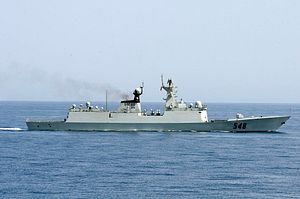The rising tensions in South China Sea, especially the arbitration lawsuit brought by the Philippines, have stimulated debate and research about China’s South China Sea policy, as well as about the United Nations Convention on the Law of the Sea (UNCLOS). For Beijing, the South China Sea dispute is essentially a dilemma with UNCLOS, which the PRC took part in negotiating from 1973 to 1982, and ratified in 1996. Officially the government stands by its determination to abide by the convention it signed and ratified. But there has been more and more discussion in recent years about the question of whether China should withdraw from UNCLOS.
It took nine years from 1973 for the international community to finalize the United Nations conference that finally agreed on UNCLOS in 1982. For the PRC, this was its first multilateral negotiation after having joined the UN in 1971. Some recent Chinese accounts shed new light on the Chinese delegation’s state of mind at the time. One important source is the memoirs of the head of the Chinese delegation, Ling Qing, who later became deputy secretary general of the UN. An interview with the two deputy heads of the Chinese delegation by a major news magazine in 2012 also provides important additional information.
All of these sources paint the same picture: In 1973 when negotiations began, China was still in the throes of the Cultural Revolution, so the Chinese delegation was given three guidelines by the leadership: be anti-hegemony (meaning anti-U.S. and anti-USSR); support the Third World; protect the national interest. They thus put ideology before interest. This was common at the time. Moreover, China was grateful for the support it got from the Third World countries, which had played an important role in deciding to let the PRC take over China’s membership in the UN from the Kuomintang government on Taiwan in 1971. Beijing believed it should support the Third World in return.
Some leading developing countries in Latin America and Africa were calling for a 50–200 nautical mile (nm) territorial sea under full national sovereignty. Those countries lacked the capabilities of developed countries, especially superpowers like the United States and USSR, to protect their waters from being exploited by others. And the U.S. and USSR tried hard to limit weaker states’ maritime rights by reducing the size of the territorial sea and Exclusive Economic Zone (EEZ). The Chinese delegation saw things from the perspective of a class struggle between the hegemonic and Third World countries. Ling Qing recalls how China eventually decided to stand with the Third World countries and supported the demand for a 200 nm EEZ, even though there were already internal discussions in the late stage of the negotiation as some Chinese had realized that a 200 nm EEZ may not belong to China’s national interests.
A book by Liu Feng, former vice president of the National Institute for South China Sea Studies, sees China as the big loser in UNCLOS due to its unfavorable geographic location. In the past, China’s geographic narratives used to emphasize its advantage in possessing a vast territory. Official geography textbooks for primary and middle schools proudly cited China’s long boundaries and coastlines, and bountiful natural resources. Only recently has it been fully realized that in spite of its 18,000 kilometer coastline, China’s geography actually inhibits the realization of its maritime ambitions. There are several main geographic disadvantages: It is open to seas but not oceans and China’s maritime space lacks breadth. Even though China borders four seas — the Bohai Sea, Yellow Sea, East China Sea, and South China Sea — all of them are enclosed by island states. This means that China has to share its maritime space with other countries. While the South China Sea offers more space, it is enclosed by nations making big sovereignty claims. The book argues that the 200 nm EEZ rule agreed upon in UNCLOS greatly restrains China’s maritime space.
China’s dilemma with UNCLOS is embodied in the arbitration case initiated by the Philippines. From China’s participation in the negotiation of UNCLOS in the 1970s to its decision to not participate in the arbitration case in 2014, over 40 years have gone by, and in that time China has experienced a tremendous transformation. Forty years is a good period of time for people to review the real implications and consequences of an important international negotiation. China’s negotiation of UNCLOS provides a good case study to understand China’s foreign policy making and its attitude toward international law and international treaties.
Zheng Wang is the Director of the Center for Peace and Conflict Studies in the School of Diplomacy and International Relations at Seton Hall University in New Jersey. He is also a Carnegie Fellow at New America and a Global Fellow at the Kissinger Institute on China and the United States of the Woodrow Wilson International Center for Scholars.

































